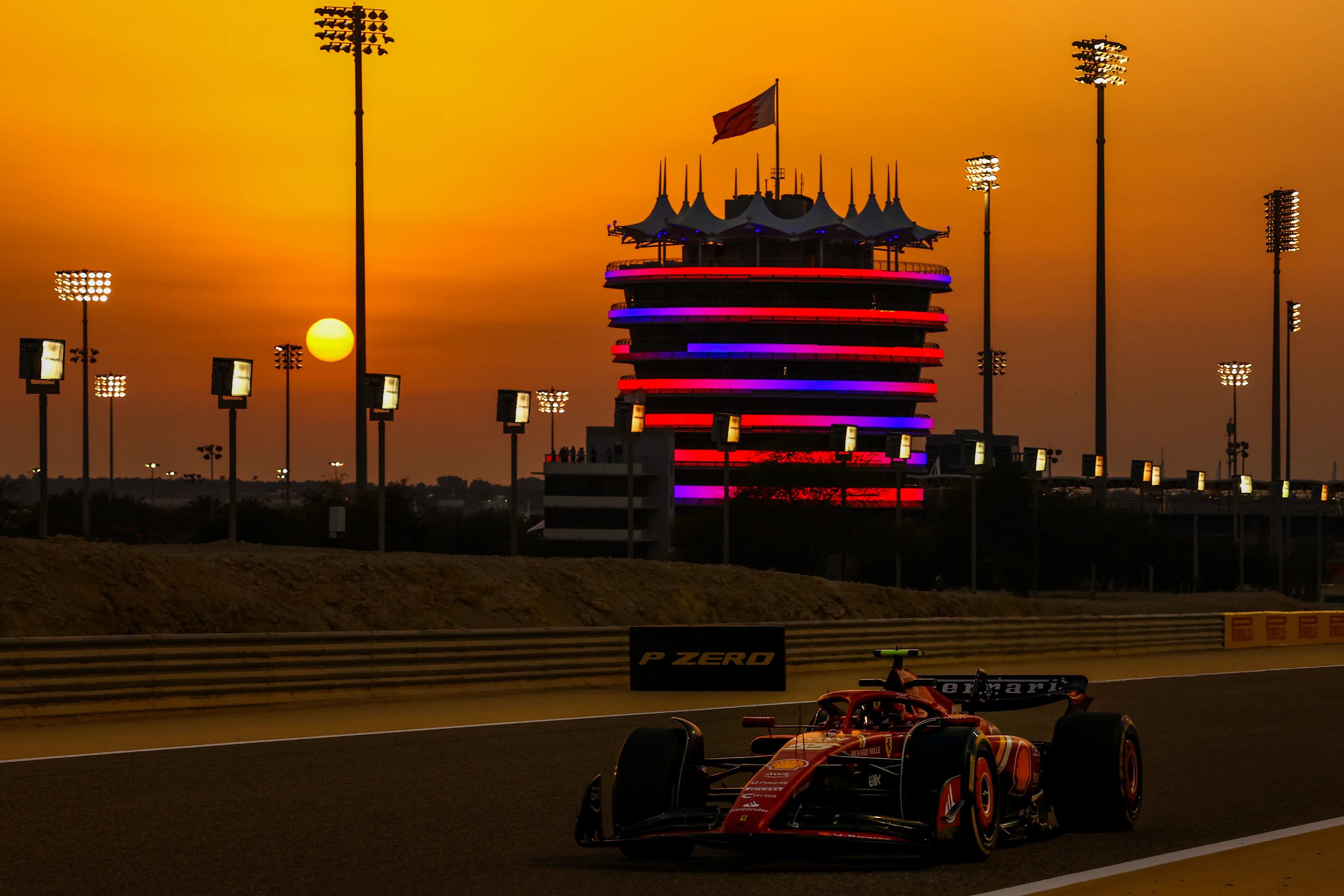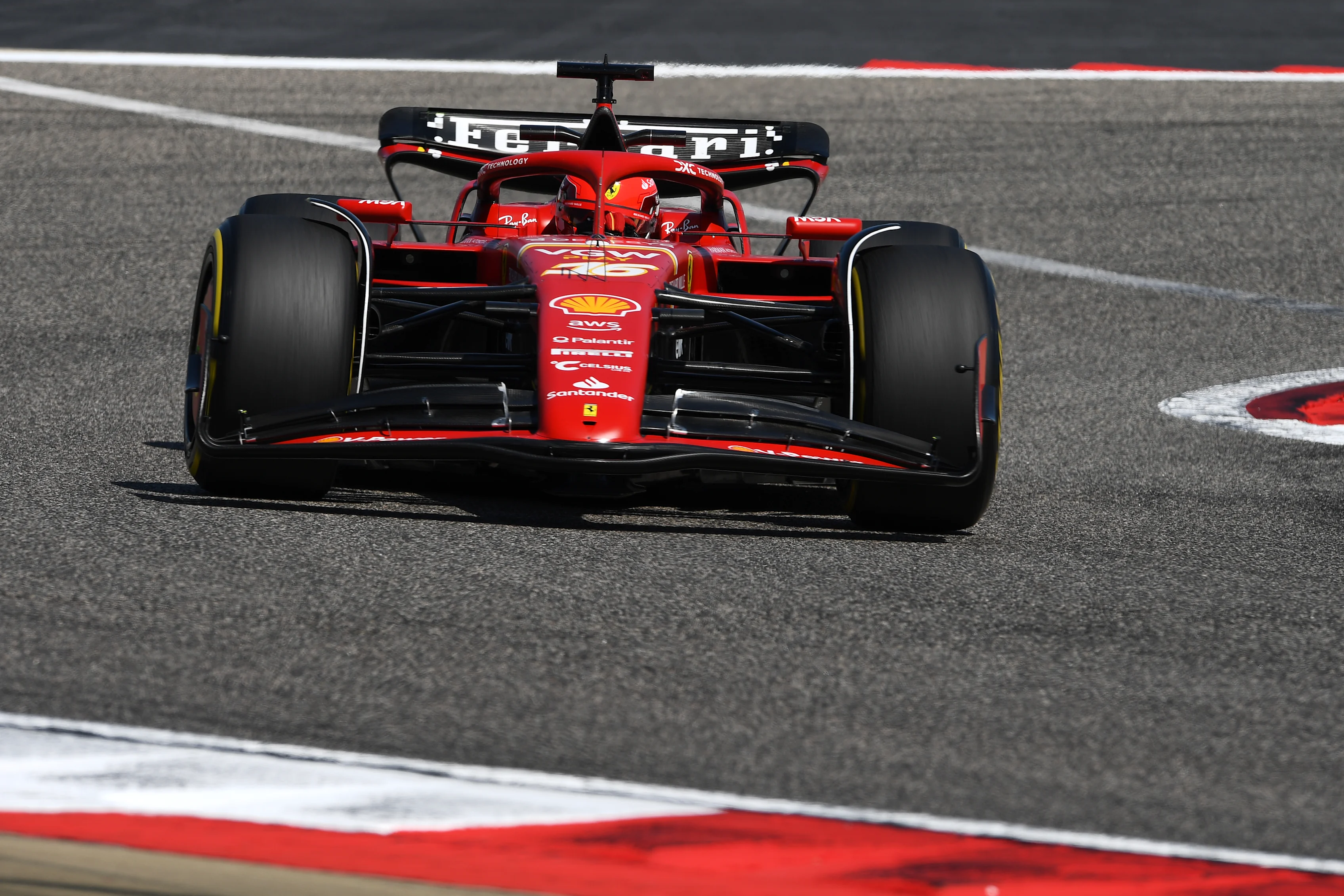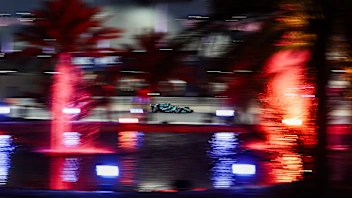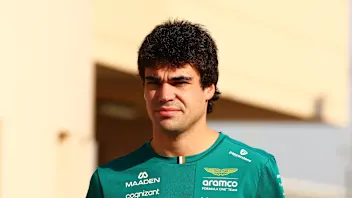With Max Verstappen giving up his scheduled afternoon slot in the Red Bull to Sergio Perez for the second day of pre-season testing, it was Carlos Sainz’s Ferrari SF-24 which headed the times.
Even if we allow 0.6s for the difference between Sainz’s C4 tyres and the C3s on which Perez was second-fastest, it still has the Ferrari around 0.1s faster on single lap pace.
WATCH: What we learned on the second day of pre-season testing in Bahrain
That 0.6s is based upon how much first Sainz, and then RB’s Daniel Ricciardo, found when they switched from their C3s to C4s, each going straight back out after making the switch, so minimising any likely variations in the track condition.
It’s a hugely encouraging showing for Ferrari and one which was backed up by a three-stint race-sim comparison between Sainz and Perez in which the Ferrari again emerged as faster. This is all with the usual provisos of comparable fuel weights and engine modes – and in the acknowledgement that Max Verstappen last year averaged 0.3s faster than team mate Perez.

Sainz is reporting that the Ferrari is far less wind-sensitive than last year’s car, something which the gusty conditions of the Sakhir circuit really put to the test. This is a very promising sign for the team in that it suggests one of the major design aims of the car has been achieved.
When reflecting on the ’23 season, Ferrari technical, director Enrique Cardile said, “[The sensitivity] was down to the shape of the aero map. Intrinsically every F1 car when you apply yaw loses downforce. It’s related to tyre wake management. The problem is how much do you lose? The wind is an amplifier of the yaw.
“So the more you lose in yaw, the more you’ll suffer from wind. Related to this is the driver confidence and how peaky the performance is. With the right condition, you have more performance but a certain type of corner with the wind, the driver doesn’t know when the gust will happen.”
At the launch of the new car, Cardile said, “We have taken on board what the drivers have told us and turned those ideas into engineering reality with the aim of giving them a car which is easier to drive and therefore easier to get the most out of and push to its limits.
“We did not set ourselves any design constraints other than delivering a strong and honest racing car which can reproduce on the race track what we see in the wind tunnel.”
In seeking to achieve this, Cardile and his team have moved towards what had become the classic ‘Red Bull-style’ of body geometry (before Red Bull themselves then moved on from that with their current car).
In place of the fat sidepod fronts of the previous two Ferraris, the SF-24 has a conventional big undercut. This has been made possible by lowering the lower cockpit side impact bar and rearranging the radiators.
READ MORE: Leclerc and Sainz give their verdicts on where Ferrari stand relative to Red Bull
This style of bodywork, working in conjunction with the underfloor channels, seeks to boost the speed of the airflow flow along the body sides and floor edges as it makes its way to the gap between the rear tyre and diffuser.
The previous fat-fronted sidepods sought to achieve the same thing in a different way – by out-washing the airflow around the sidepods. The bluff fronts would create a high-pressure area which would cause the oncoming air to swerve outwards away from the car’s body, only for the low-pressure area between the wheels at the back then pulling that flow back inwards.

In practice, what Charles Leclerc and Sainz found was that at high speeds and cross winds, the rear could surrender its downforce quite suddenly, making it a tricky car to drive on the limit. Cardile and his aero department believe that as the car changes direction from straight-ahead on the entry to a corner, the downforce is more consistent using the undercut bodywork than the outwash.
It’s early days yet, but Scuderia fans can be greatly encouraged by what testing has so far suggested.
Next Up
Related Articles
.webp) Why Audi's new-look bodywork in Bahrain got people talking
Why Audi's new-look bodywork in Bahrain got people talking Watch as F1 TV analyse Day 3 of first Bahrain test
Watch as F1 TV analyse Day 3 of first Bahrain test/16x9%20single%20image%20-%202026-02-12T105625.335.webp) Leclerc sets morning pace on Day 2 of Bahrain test
Leclerc sets morning pace on Day 2 of Bahrain test What we learned from Day 3 of the first Bahrain test
What we learned from Day 3 of the first Bahrain test Stroll claims Aston are ‘four-and-a-half seconds’ off pace
Stroll claims Aston are ‘four-and-a-half seconds’ off pace Wheatley ‘proud’ of Audi’s progress across pre-season testing
Wheatley ‘proud’ of Audi’s progress across pre-season testing

.webp)